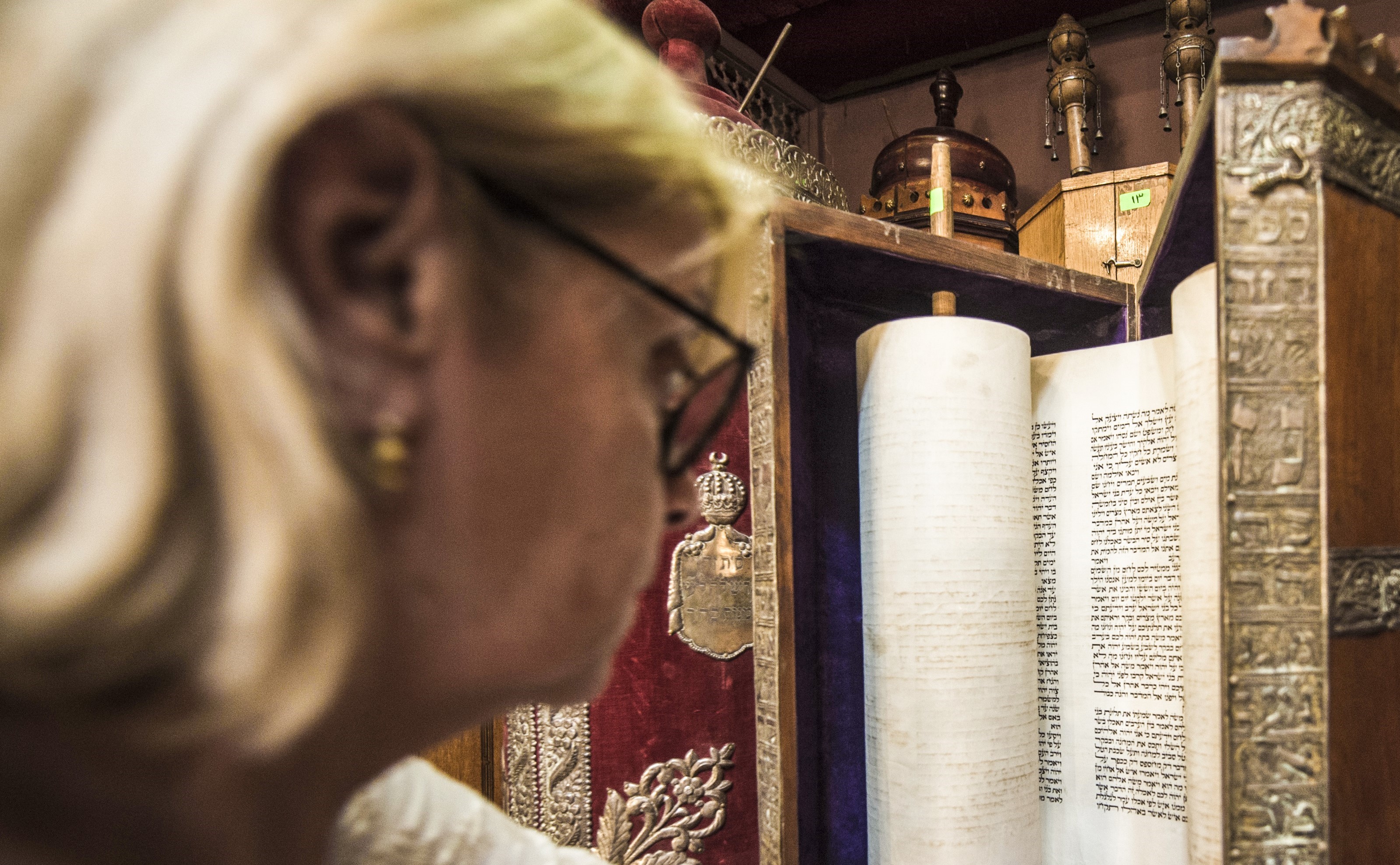
The truth behind Israeli propaganda on the 'expulsion' of Arab Jews
Israeli propaganda about the "expulsion" of Arab Jews from Arab countries in the late 1940s and early 1950s continues without respite. Earlier this month, Israel's UN ambassador, Gilad Erdan, informed UN Secretary-General Antonio Guterres that he "intends to submit a draft resolution requiring the international body to hold an annual commemoration for the hundreds of thousands of Jews exiled from Arab countries due to the creation of the State of Israel," according to a report in Ynet.
The history of Arab Jewish immigration to Israel is not one of expulsion by Arab regimes, but rather one of Israeli criminal actions and conspiracies
Israel's fabrications about the immigration of Arab Jews to Israel are so outrageous that the country holds a commemoration on 30 November each year. This date just happens to coincide with the ethnic cleansing by Zionist gangs of Palestine, which began on 30 November 1947, a day after the UN General Assembly adopted the Partition Plan. The choice of date seeks to implicate Arab Jews in the conquest of Palestine, when most had no role in it.
Erdan alleges that, after the establishment of the Israeli settler-colony, Arab countries "launched a widespread attack against the State of Israel and the thriving Jewish communities that lived within [the Arab world]". Israeli fabrications, with which Israel always hoped to force Arab countries into paying Israel billions of dollars, have a second important goal: to exonerate Israel from its original sin of expelling Palestinians in 1948 and stealing their land and property.
Ideological pitfalls
In December 1948, the UN General Assembly mandated that Palestinian refugees be allowed to return home and that they be compensated for the destruction and theft of their property by Israel. Israel not only wants to hold on to all of those lands, but to extort Arab countries to pay out billions more.
Stay informed with MEE's newsletters
Sign up to get the latest alerts, insights and analysis, starting with Turkey Unpacked
There is a further irony to the Israeli ploy: Israel has always insisted that Palestine, and later Israel, is the homeland of world Jewry, while simultaneously claiming that Arab Jews who immigrated to Israel are "refugees". The legal and internationally accepted definition of a refugee, however, is of a person who was expelled or fled their homeland, not one who "returns" to their homeland.
These ideological pitfalls aside, the history of Arab Jewish emigration to Israel is not one of expulsion by Arab regimes, but rather one of Israeli criminal actions that forced Jews in Yemen, Iraq, Morocco, Egypt and other countries to leave for Israel.
In 1949, the Israeli government was working assiduously with British colonial authorities in Aden and with Yemeni officials to airlift Yemeni Jews to Israel. While the League of Arab States had resolved to ban the emigration of Arab Jews to Israel, Yemen's imam allowed Jews to leave as early as February 1949, with the help of Zionist emissaries and Israeli bribes to provincial Yemeni rulers, according to prominent Israeli historian Tom Segev's book: 1949: The First Israelis.
Some provincial rulers asked that at least 2,000 Jews remain, as it was the religious duty of Muslims to protect them, but the Zionist emissary insisted that it was a Jewish religious "commandment" for them to go to the "Land of Israel". The fact that Israel's prime minister at the time was David Ben Gurion also suggested to many that Israel "was the kingdom of David," according to Segev and other sources. Tens of thousands of Jews were urged to leave their homes and travel to Israel.
Institutionalised discrimination
As for the Jews who opted to stay, the Jewish emissary in Aden, Shlomo Schmidt, asked permission to propose that Yemeni authorities expel them, but Yemeni authorities did not.
Some of the luggage of the departing Jews, including ancient Torah scrolls, jewellery and embroidered garments, which they were encouraged to bring with them, disappeared en route and mysteriously "made their way to antique and souvenir shops in Israel," according to Segev and other sources.
About 50,000 Yemeni Jews were essentially removed from Yemen by the Israelis in 1949 and 1950 to face institutionalised Ashkenazi discrimination in Israel. This included the abduction of hundreds of Yemeni children from their parents, who were told the children died; the children were then allegedly handed over for adoption to Ashkenazi couples.
Zionists were also active in bringing about the emigration of Morocco's Jews to Israel. Morocco was under French colonial occupation at the time, so the Jewish Agency had to strike an agreement with the French governor of Morocco to bring about the emigration of Moroccan Jews, who had to face horrific conditions on Israeli ships, according to Segev and other sources. Some of the 100,000 Jews who left, according to the Jewish Agency emissary, had to be virtually "taken aboard the ships by force".
Meanwhile, the Iraqi government of Nuri al-Said, Britain's strongman in the Arab east, was maligned by Israeli propaganda that it was persecuting Jews, when in fact these were Israeli fabrications. Zionist agents had been active in Iraq, smuggling Jews through Iran to Israel, which led to the prosecution of a handful of Zionists.
Then, attacks on Iraqi Jews began, including at the Masuda Shemtov synagogue in Baghdad, killing four Jews and wounding around a dozen more. Some Iraqi Jews believed that this was the work of Mossad agents, aiming to scare Jews into leaving the country. Iraqi authorities accused and executed two activists from the Zionist underground.
Amid Israel's global campaign to pressure Iraq into allowing Jews to leave - which led to Israeli attempts to block a World Bank loan to Iraq, accompanied by American and British pressure - the Iraqi parliament relented and issued a law permitting Jews to leave. Zionist agents in Iraq telegraphed their handler in Tel Aviv: "We are carrying on our usual activity in order to push the law through faster." Iraq's 120,000 Jews were thus soon transferred to Israel.
Targeting western interests
Among Egypt's relatively small Jewish community, an even smaller number were Ashkenazi (mostly from Alsace and Russia) who arrived since the 1880s. The larger community consisted of Sephardi Jews who arrived during the same period from Turkey, Iraq and Syria, in addition to the tiny community of Karaite Jews. All in all, they numbered fewer than 70,000 people, half of whom did not hold Egyptian nationality.
Zionist activism among the small community of Ashkenazi Jews in Egypt led some to go to Palestine before 1948. However, it was after the establishment of Israel that many of Egypt's upper-class Jews began to leave to France, not Israel. Nonetheless, the community remained essentially intact until Israel intervened in 1954, recruiting Egyptian Jews for an Israeli terrorist cell that placed bombs in Egyptian cinemas, the Cairo train station as well as American and British educational institutions and libraries.
The Israelis hoped that by targeting western interests in Egypt, they could sour the then-friendly relations between Egypt's president and the Americans.
Egyptian intelligence uncovered the Israeli terrorist ring and tried the accused in open court. The Israelis mounted an international campaign against Egypt and president Gamal Abdel Nasser, who was dubbed "Hitler on the Nile" by the Israeli and western press, while Israeli agents shot at the Egyptian consulate in New York, according to David Hirst's book The Gun and the Olive Branch and other sources.
When Israel joined the British-French conspiracy to invade Egypt in 1956, and after its military occupation of the Sinai Peninsula, public rage ensued against the settler-colony
Combined with the new socialist and nationalist campaign of Egyptianising investments in the country, many rich businessmen began to sell their businesses and leave.
By the time nationalisation began in the late 1950s and early 1960s, most of the nationalised businesses were in fact owned by Egyptian Muslims and Christians, not Jews. It was in this context, and in the context of public rage against Israel, that many Egyptian Jews got scared and left after 1954 to the US and France, while the poor ended up in Israel (as recounted in Joel Beinin's Dispersion of Egyptian Jewry).
When Israel joined the British-French conspiracy to invade Egypt in 1956, and after its military occupation of the Sinai Peninsula, public rage ensued against the settler-colony. The Egyptian government detained about 1,000 Jews, half of whom were Egyptian citizens, according to Beinin, and Egypt's small Jewish community began to leave in droves. On the eve of Israel's second invasion of Egypt in 1967, only 7,000 Jews remained in the country.
Formal invitations
Despite Israeli culpability in bringing about the exodus of Arab Jews from their countries, the Israeli government continues to blame it on Arab governments. As for the property of Arab Jews, indeed, they should be fully entitled to it and/or to compensation - not on account of some fabricated expulsion narrative that serves the interests of the Israeli state, but on account of their actual ownership.
Contrary to Israeli propaganda that there was a population swap, it is notable that while European and Arab Jews who emigrated to Israel were given the stolen land and properties of expelled Palestinians free of charge, according to Israeli historian Benny Morris and other sources, the Palestinians did not receive the property of the Arab Jews who migrated to Israel.
Indeed, the Palestine Liberation Organization, which in 1974 received recognition by the Arab League and the UN as "the sole legitimate representative of the Palestinian people," was very aware of this Israeli strategy. Understanding that the emigration of Arab Jews to Israel was a boon to the Israeli settler-colony, the PLO demanded, in a much-publicised 1975 memorandum to the Arab governments whose Jewish populations had left to Israel, that they issue formal and public invitations for Arab Jews to return home.
Notably, none of the governments and regimes in power in 1975 were in office when the Jews left between 1949 and 1967. Public and open invitations were duly issued by the governments of Morocco, Yemen, Libya, Sudan, Iraq and Egypt for Arab Jews to return home, especially in light of the institutionalised Ashkenazi racist discrimination to which they had been subjected in Israel. Neither Israel nor its Arab Jewish communities heeded the calls.
Rewarding crimes
All this aside, there is the matter of Israel's unceasing attempts to equate the financial losses of Arab Jews with those of Palestinian refugees. A conservative official Israeli estimate comparing Palestinian property losses to Arab Jewish property losses gave a ratio of 22 to one in favour of Palestinians - despite Israel's gross overestimation of Arab Jewish losses and even grosser underestimation of Palestinian losses.
Researchers' conservative estimates of Palestinian refugee losses amount to more than $300bn in 2008 prices, excluding damages for psychological pain and suffering, which would raise the total substantially. This excludes the losses in confiscated land and property for Palestinian citizens of Israel since 1948, and the losses incurred by Palestinians in the occupied West Bank, Gaza and East Jerusalem since 1967.
Whereas none of the Arab regimes in power when Arab Jews emigrated to Israel exists today, the same Israeli colonial-settler regime that expelled the Palestinian people and engineered the exodus of Arab Jews from their countries remains in power.
Yet, in his letter, Erdan complains that "it is infuriating to see the UN mark a special day and devote a lot of resources for the issue of 'Palestinian refugees,' while abandoning and ignoring hundreds of thousands of Jewish families deported from Arab countries and Iran". The irony of Erdan's letter is that it demands that the Israeli regime be financially and morally rewarded for the crimes it has committed over the last seven decades.
The views expressed in this article belong to the author and do not necessarily reflect the editorial policy of Middle East Eye.
This article is available in French on Middle East Eye French edition.
Middle East Eye delivers independent and unrivalled coverage and analysis of the Middle East, North Africa and beyond. To learn more about republishing this content and the associated fees, please fill out this form. More about MEE can be found here.








